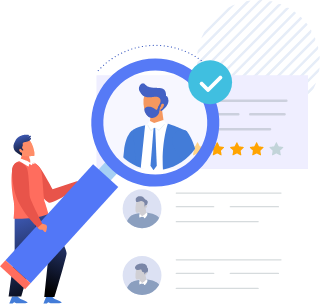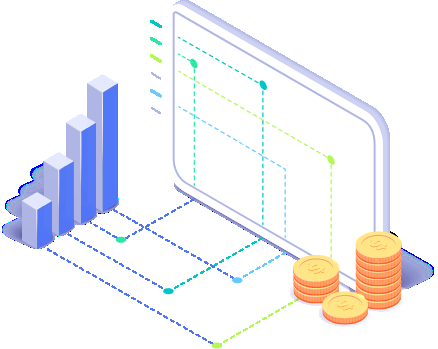eLearning Software Development Company
Developing engaging, scalable, and personalized eLearning software solutions
Experience innovation and excellence for your custom eLearning development project with YTII development experts. We are an educational software development company with a relentless pursuit of crafting innovative EdTech solutions.

-
Top Rated Talent
-
IP Protection & Strict NDA
-
Quick & Easy Onboarding Process
-
Flexible Hiring Models
eLearning Software Development Services We Provide
With a unique blend of expertise and innovation, we deliver top-notch eLearning solutions that are designed explicitly to meet specific educational institutions' and organizations' requirements. Here is a quick walkthrough of the education software development services we offer:
E-learning software development
Making educational resources easily accessible and engaging with custom eLearning software and app development. We employ native or cross-platform technologies, responsive design principles, and dynamic content authoring tools for creating tailored software solutions. Hire top software development professionals to provide a seamless learning experience for your users.
Elearning content management
We specialize in organizing, curating, and delivering engaging educational content tailored to your specific needs. From course creation to content updates, we provide end-to-end solutions to enhance your eLearning app experience. Our content management system ensures that your learning materials are easily accessible, up-to-date, and optimized for various devices.
Elearning software integration
Whether it's integrating Learning Management Systems (LMS), content delivery networks, or third-party applications, our solutions ensure smooth data flow and improved functionality. We seamlessly connect various eLearning tools and systems to create an efficient and unified learning environment. Hire eLearning software development experts to perform smooth integrations.
Educational software consulting
Navigating the complexities of eLearning development with expert consultations for EdTech solutions. Our educational software consulting services comprise thorough requirements evaluation, e-learning software strategy development, assessing the right technology based on the project needs, and suggesting a plan of action for the project implementation.
(1).png?width=590&height=399&name=cta-image-1(1)(1).png)
Partner with YTII software development experts to fuel your business growth with custom eLearning solutions tailored explicitly to your unique project requirements.
eLearning Software Development Solutions We Provide
Our custom e learning solution ensures a smooth learning experience for educators and students, boosting engagement and results. Here's how we tackle your education and eLearning software challenges:
e-Learning portals
We provide your learners with a personalized and user-friendly interface to access your online courses through an eLearning portal. Our portal offers single sign-on (SSO), collaborative features, and resource aggregation.
Remote monitoring software
Ensure the integrity and validity of your online assessments and exams with remote monitoring software solutions. Our remote monitoring software is equipped with features that include live monitoring, biometric authentication or ID verification, and recording or reviewing the test sessions.
Learning experience platform (LXP)
Create a modern and flexible learning environment for your learners. With our learning experience platform solution, your learners can discover, access, and share content from various sources. This includes AI-powered recommendations, peer interactions for knowledge sharing, and adaptive learning paths.
Knowledge management solutions
Use our knowledge management system (KMS) solution to capture, store, and transfer your organization's or community's learning and experience. Our KMS includes a centralized knowledge base, collaboration tools, and access controls.
Learning management systems (LMS)
We deliver e-learning programs using a dynamic LMS with high-grade features, including hyper-personalized course recommendations, virtual classrooms, and skill assessment systems. Our custom lms development solutions streamline educational processes and boost learning & knowledge retention by 40%.
Mobile learning solutions
Offer a convenient and flexible way for your learners to access your content and online courses anytime, anywhere, with a custom software development solution. This solution includes offline access, push notifications, and interactive mobile features.
Why Partner with YTII for eLearning Innovation?
As a leading eLearning software development company, we have created secure, customized, and sustainable digital solutions for various industries. Our proven track record demonstrates our ability to deliver smooth development, advanced features, and dedicated support, making us the ideal choice for strong and cutting-edge eLearning projects. Here's why we stand out as your top choice:
- Highly Skilled and Top Rated Developers
- Direct Access to the Developer As Your Own Employee
- Dedicated Relationship Manager
- CI/CD Best Practices
- Core Engineering Team Support
- Devops Team Support
- Data Security & IP Protection
- Excellent Communications Skills & Timezone Overlap
Facilitating digital learning with smart interactive solutions
Enhance your educational institution or corporate structures with YTII’s user-centric solutions.
Learning experience platforms
- User analytics
- Video streaming solutions
- Content creation and aggregation
- AI-based recommendation system
- Social features like interactions through chat, forums

Peer-to-peer learning
- Video recording and sharing
- Instant tutoring sessions
- Microcontent and micro tests
- Smart virtual study groups based on student's activities
- Collaboration with other students inside and outside their friend network

Mobile learning
- Smooth user experience
- Robust security measures
- Exceptional performance, no matter how many learners are using the system at once

Achieve 10 times better user engagement with top-quality educational software
Sharpen your competitive edge in the eLearning industry with efficient, customized eLearning software solutions developed by our top experts.
Technical Expertise of our eLearning Developers
Advanced Tech Stack we use for eLearning Software Development
Using advanced technologies such as AI, ML, and IoT, our programmers curate interactive, engaging, and personalized user experiences. We empower educational institutions, corporate training centers, and education content providers with advanced e-learning web app development solutions.
AI and ML
We use our programmers' expertise to create digital educational platforms using the power of artificial intelligence and machine learning. These platforms offer personalized learning experiences, gather content from various sources, and automate routine tasks. Our adaptive learning platforms and intelligent tutoring systems give real-time feedback and personalized support to users.
Extended reality
Our immersive AR/VR solutions convert conventional learning experiences into interactive, highly effective, and engaging educational experiences. We design realistic virtual environments using 3D models and augmented reality overlays, customizing educational experiences to suit individuals' learning paces and styles.
IoT
Leveraging the power of IoT, we make education accessible with advanced software applications. Our IoT-enabled solutions transform traditional learning experiences by personalizing them, connecting devices, and enhancing interactivity. This enables dynamic and real-time interaction with smart devices.

Cloud computing
Our cloud-based solutions make it easy to access educational resources from anywhere at any time. From interactive learning platforms to virtual classrooms, our apps improve the teaching and learning experience. They allow real-time collaboration, secure data storage, and high availability.
AI and ML
We use our programmers' expertise to create digital educational platforms using the power of artificial intelligence and machine learning. These platforms offer personalized learning experiences, gather content from various sources, and automate routine tasks. Our adaptive learning platforms and intelligent tutoring systems give real-time feedback and personalized support to users.
Extended reality
Our immersive AR/VR solutions convert conventional learning experiences into interactive, highly effective, and engaging educational experiences. We design realistic virtual environments using 3D models and augmented reality overlays, customizing educational experiences to suit individuals' learning paces and styles.
IoT
Leveraging the power of IoT, we make education accessible with advanced software applications. Our IoT-enabled solutions transform traditional learning experiences by personalizing them, connecting devices, and enhancing interactivity. This enables dynamic and real-time interaction with smart devices.
Cloud computing
Our cloud-based solutions make it easy to access educational resources from anywhere at any time. From interactive learning platforms to virtual classrooms, our apps improve the teaching and learning experience. They allow real-time collaboration, secure data storage, and high availability.

Education Software Development Solutions for every eLearning need
No one size fits all! That is why we have a unique eLearning solution to meet a project's specific requirements. Below are some organization types that can benefit from our education software development solutions.
Academic Institutions
Get personalized eLearning solutions designed for schools, colleges, training centers, and universities. Our advanced software helps organize curriculum, address learning gaps, boost knowledge retention, and enhance students' educational experience.
Corporate Firms
Empower your workforce to thrive in their current job roles with our GDPR-compliant online corporate training systems. We create customized corporate training systems, including upskilling courses, webinars, workshops, and live virtual training sessions with performance-tracking mechanisms.
EdTech Companies
Accelerate your EdTech project's ROI with our eLearning software development company. Our top 1% global IT talent offers expertise in cutting-edge technologies, providing end-to-end services for innovative learning platforms, educational apps, and interactive training systems.
Mass Market
We create eLearning software for global access to educational content anytime and anywhere. These EdTech solutions include mobile learning apps, microlearning, and online course platforms for self-paced learning.
YTII's eLearning Software Development Timeline
At YTII, we recognize the importance of meeting deadlines. Here are the estimated timelines for obtaining an innovative software solution for your eLearning project.
Educational Software
Development Project Initiation
Less than 7 days
MVP Release
Within 2-3 months
New ELearning
Software Versions
Within 30 days
Our Success Stories
We assist both new and emerging startups in developing MVPs, forming teams, and gaining access to cutting-edge technologies. From application creation to modernization and maintenance, our 360° enterprise solutions cover it all.

GoHire
Leading Application Tracking System (ATS) in Europe
Project Scope- GoHire wanted to build a robust hiring solution for SMEs globally that allowed them to hire the right candidates for their organization easily and quickly.
Solution Delivered- After a detailed discussion with clients regarding the project requirements, YTII recommended the Product Engineering Model of the Offshore Development Center
Read Full Story

Dorey Finance
Actuarial Technology (AcTech) company in Guernsey
Project Scope – The client wanted to upgrade its financial tool to improve user experience, reduce operational costs, and address performance issues caused by outdated technology.
Solution Delivered – We helped them deploy a senior developer within two weeks, upgraded tech stack, and optimized performance and overall operational efficiency.
Read Full Story

Finding You
Robust Dating App in Luxembourg
Project Scope – Finding You wanted to create a dating app combining astrology and psychometric analysis and build a budget-friendly, user-friendly matching engine.
Solution Delivered – The app was built with advanced astrological charting and filtering features, while marketing efforts helped expand the user base globally.
Read Full Story

Gettrx
Leading Payment Gateway in US
Project Scope – Gettrx sought a dependable team of experienced IT resources that took care of end-to-end development and management of the solution while ensuring code standards were being met at all time.
Solution Delivered – Your Team" in India deployed highly skilled software engineers with 6+ years of experience in handling complex product development in an agile work model
Read Full Story

Plena Data
Financial Process Automation (USA)
Project Scope – The client sought an offshore software development company that could provide them with the right talent to build premium-quality bots in a quick turnaround time while ensuring complete IP protection.
Solution Delivered – With a team of highly skilled professionals working on developing RPA solutions, the client was able to deliver high-quality bots to their customers quickly and efficiently.
Read Full Story
Clients’ Testimonials: Establishing Digital Trust
We love partnering with new clientele! YTII has more than 3000 satisfied clients who continuously support us via their feedback, more projects, and suggestions.

Using offshore development services by Your Team in India, we hired highly skilled developers who helped us build a robust and scalable candidate automation solution. Their hands-on project management and seamless communication never made us realize we were working with an offshore partner.

We were highly impressed by the hands-on approach shown by Your Team in India. After understanding our requirements, they quickly arranged interviews with their talented developers. Our offshore team was ready and working on the project within a few days. We worked with highly-talented and experienced developers who helped us improve the product while ensuring they met all delivery milestones.

We could not have asked for a better partner than Your Team in India to manage our product. Our offshore development team of experts always shares insights on improving our solution.

Your Team in India is genuinely a partner you can count on. With over 1.5 years of experience working with them, I have witnessed their unwavering commitment to understanding their clients' passions and delivering exceptional results. I highly recommend them as a reliable and dedicated outsourcing partner.

Amit and his team are great. They were able to complete the requested job faster than I had expected and went above and beyond to identify things I was unaware of. They went on to make these other small corrections without additional cost during the updates. I have hired this team before and will hire them again, as I am reminded of their high level of professionalism, integrity and ability... Thanks Amit !!.

Your Team in India has been our partner since the start of TeleCloud’s automation journey. Their in-depth consulting capabilities, easy to comprehend plans and a ground up, practical implementation approach helped us automate multiple processes within the organization. At present, YTII has implemented more than 50+ bots that sort various day to day accounting, book keeping and compliance related processes for TeleCloud. We believe our drive for automation has just begun and will continue till we enable a bot for every process that can be automated.

Your Team In India's pool of talent is incredibly efficient. They gave us unabridged access to the best full stack developers, enabling us to build an amazing product- one that’s best to our capabilities.
User Guide to eLearning Software Development
Good quality educational software brings better engagement and cost savings without compromising on advanced features that exhibit an immersive learning experience, seamless accessibility, and comprehensive knowledge development. Let's check out some must-have features of top-quality educational software.
1. Immersive learning experience
An educational eLearning software must offer an immersive learning experience. It should be equipped with interactive educational modules, social learning, gamification, and virtual classroom training,
2. Ease of accessibility
E learning platforms must be designed with ease of accessibility in mind. This must work with multi-device login, offline access options, mobile web or desktop syncing, and easy registrations through social or Google accounts.
3. Learning analytics and data visualization
The digital learning platforms must have comprehensive learning data and analytics systems with features like course activities, user activity dashboards, audit trails, user segmentation mapping, course content analytics dashboards, performance reporting, and ROI assessments.
4. Robust security and administration
Educational software must adhere to robust security and administration standards. Its security and administrative features include role-based access, user management, online scheduling, test assessment, certification management, content filtering, support ticket creation, payment systems, and multichannel delivery.
5. Dynamic content authoring
The built-in customizable course templates, content segmentation modules, learning content editors, multilingual support, and user-generated content all come under the dynamic content authoring features.
When hiring a software developer to create e-learning platforms, it's important to find someone with the right mix of technical skills, industry knowledge, and personal skills. This ensures they can deliver a high-quality, interesting, and user-friendly educational solution. Here are the key skills to look for:
- Proficiency in using eLearning software like Articulate Storyline 360, Adobe Captive, Lectora Online, and iSpring suite
- Familiarity with SCROM standards
- Expertise in coding languages like JavaScript, HTML, Angular, and CSS
- Understanding of instructional design models such as ADDIE and SAM
- Knowledge of applying pedagogical principles to create effective learning experiences
- Skilled in creating and editing multimedia content, including video production, graphic design, and audio editing
- Ability to manage and organize large volumes of content within LMS like Moodle, Blackboard, or Canvas
- Strong project management skills to handle multiple projects simultaneously
- Familiarity with front-end frameworks such as React, Angular, and Vue.js and back-end frameworks such as Django, Ruby on Rails, or Laravel.
- Ability to create responsive and interactive user interfaces using HTML5, CSS3, and contemporary JavaScript frameworks.
- Familiarity with cloud platforms for scalable and dependable deployment, such as AWS, Azure, or Google Cloud.
- Knowledge of the integration of multimedia, encompassing interactive, audio, and video components
- Proficiency in creating intuitive user interfaces that meet the requirements of educators, administrators, and students.
The role of an education software developer is diverse in creating an elearning software solution. It includes researching and selecting appropriate content, incorporating interactive and multimedia elements, creating and organizing course materials, designing the user experience, and developing the technical aspects of the course. The key roles and responsibilities of eLearning developers include:
- Create and implement an extensive curriculum that complements the organization's educational aims and objectives.
- Apply instructional design principles to produce resources that support productive learning environments.
- Make thorough storyboards that describe the eLearning modules' organization and flow.
- Construct and manage online courses for Learning Management Systems (LMS) and other e-learning environments.
- Determine areas for improvement, evaluate the effectiveness of eLearning materials, create reports, and analyze data.
- Ensure that e-learning materials adhere to industry norms and laws, including Section 508, ADA, and SCORM.
- Address eLearning platform technical problems to guarantee a smooth user experience.
- Incorporate multimedia like audio, video, animation, and interactive features to encourage learners' engagement.
eLearning software changes how we learn and acquire skills by providing a dynamic and engaging alternative. Here's how eLearning software benefits both learners and organizations:
For learners:
Convenience & Flexibility
Learn at your own pace, anytime, anywhere. eLearning software accommodates busy schedules and diverse learning styles.
Personalized Learning
Learners get interactive modules, customized content, and adaptive learning paths that cater to individual needs and preferences.
Enhanced Engagement
It provides interactive features, gamification elements, and multimedia content to keep learners motivated and focused.
Accessibility & Scalability
eLearning software makes quality education accessible to a wider audience, irrespective of location barriers.
Immediate Feedback & Self-Assessment
Educational software offers real-time feedback and progress tracking. This empowers learners to monitor their understanding and identify areas for improvement.
Cost-Effective
eLearning software removes expenses associated with traditional classroom learning, such as travel and physical materials.
For organizations or educational institutions:
Reduced Training Costs
eLearning eliminates the requirements for in-person instructors, venue rentals, and travel expenses.
Scalability & Wider Reach
It can train large employee groups simultaneously across different locations and with minimal logistical challenges.
Improved Knowledge Retention
Interactive elements and spaced repetition techniques of the eLearning software promote better knowledge retention compared to traditional methods.
Flexibility & Easy Updates
Users can easily update and adapt training content quickly and efficiently to align with evolving needs and industry standards.
Performance Tracking & Analytics
Gain valuable insights into learner progress and identify areas for improvement within training programs.
Deciding to invest in eLearning software can greatly benefit your organization. However, choosing the right partner from many educational software development companies can be overwhelming. This guide will help you confidently navigate your options and select a company that perfectly meets your needs.
1. Defining your eLearning Vision
Before getting started with your search for a reliable education software development company, clearly define your project. Here's what you must consider:
- Project Scope: What type of eLearning software do you envision? Is it a Learning Management System, mobile app, simulation platform, or any other?
- Target Audience: Who are you designing this custom elearning solution for? It is crucial to understand their age, technical skills, and preferred learning styles at this point.
- Learning Objectives: What knowledge or skills do you want learners to gain? Clearly defined objectives can guide the development process with aptness and clear vision.
- Budget & Timeline: Be realistic about your financial resources and desired timeframe for project completion.
2. Research the potential partners
Research your potential e learning software development partners. From expertise to review, check out everything that ticks all the boxes of our requirements. Look for the following:
- Check out their relevant industry expertise. Does the company have a proven track record in developing eLearning software? Especially for your target audience or desired learning style?
- Review their past project experience.
- Read testimonials and reviews from past clients.
- Ensure their expertise aligns with the technologies you need for your project.
3. Communication & Collaboration
Clear communication throughout the software development process is like a strong foundation. Ensure that the partner communicates clearly throughout the custom elearning development. Are they responsive? Look for an elearning software development company willing to adapt to your specific needs and include your feedback throughout development.
4. Security & scalability
eLearning software handles sensitive learner information. Therefore, prioritizing security and scalability is of utmost importance. Ensure that the elearning development company has robust data security measures in place to protect learner information.
5. Costing
Find the right match that best fits your budget requirements. Indeed, choosing a software development company is like an investment, but budgeting is still important. Ensure that the development partner matches your budget as well.
Prioritizing Data Security
eLearning software often deals with sensitive information, so it's crucial to prioritize data security and compliance. This involves taking several measures to ensure both compliance and security.
Data Encryption
Advanced encryption methods protect data during transmission and storage. Incorporating data encryption can keep it safe from breaches.
Regulatory Adherence
In different educational settings, online learning solutions must follow specific industry rules, like HIPAA or GDPR.
User Authentication
Implementing strong user authentication protocols can ensure that only authorized users can access the eLearning content.
Regular Audits and Updates
Regular security audits and updates are necessary to identify vulnerabilities and promptly apply fixes.
Our Blog
Read on the topics that matter most to you through our comprehensive research articles & informative blogs.

Fintech App Development Costs: How to Budget and Plan for Success

FinTech Software Development Outsourcing: Pros & Cons Overview

Best Programming Language for FinTech Software Development
Frequently Asked Questions
The key eLearning software development benefits include the following:
- On-demand access to educational resources
- 10x boost in knowledge retention and skill development.
- Better learning assessment solutions.
- Greater opportunity to monetize educational solutions.
- 60% faster upskilling for professionals.
The cost of developing eLearning software will vary based on your specific educational needs, project timeline, technical complexities, developers' skills, and infrastructure requirements. However, you can get an accurate quote for your project requirements by connecting with YTII's software development experts.
The time required to develop eLearning software will vary depending on the project's complexities and your specific EdTech needs. Please get in touch with us to get an accurate idea of the duration needed to deliver your eLearning mobile development project.
At YTII, we are dedicated to offering cutting-edge software solutions to our clients. Here are some of the platforms we utilize for e-learning software development:
- Microsoft Power BI
- Microsoft Dynamics
- Microsoft Power Platforms
- PowerApps
- Azure
- Amazon Web Services
- Google Cloud

Get Your FREE Guide to Hire Top 3% Tech Talent
- Insight-driven.
- Cost-optimized
- Future-focused

